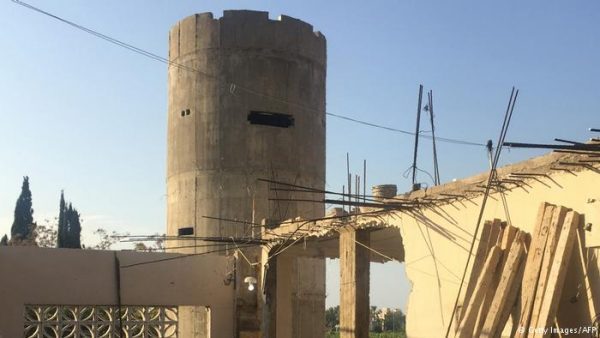
Palestinian resistance movement Hamas has criticized plans by the Lebanese authorities to build a concrete wall around a Palestinian refugee camp in southern Lebanon.
The planned wall, the group said in a statement, is “the wrong way to deal with the issue of Palestinian refugees”.
On Tuesday, reports emerged that the Lebanese authorities had begun erecting a concrete barrier around Ain al-Hilweh, the country’s largest Palestinian refugee camp.
Located southeast of Lebanon’s coastal city of Sidon, Ain al-Hilweh population in the early 2000’s was around 70,000 residents. This changed when the Syrian civil war broke out in 2011, causing the population to swell to 120,000 Palestinian refugees.
“This wall… will only serve to hurt the refugees’ cause, threaten their future, harm their interests and contribute to the deterioration of their already-dire humanitarian condition,” Hamas said.
The group criticized what it described as Lebanon’s policy of “the collective isolation” of Palestinian refugee camps on its territory.
Hamas went on to assert that the planned wall would represent a violation of international law and the principles of human rights, and would likely strain Palestinian-Lebanese relations.
According to UN figures, roughly 460,000 Palestinian refugees are currently living in 12 major camps scattered across Lebanon.
To stop the infiltration of terrorists
“The construction of the wall began some time ago and the aim is to stop the infiltration of terrorists inside Ain al-Helweh from nearby orchards,” said a source from Lebanon’s military to the AFP news agency.
The military source said Lebanon “is not building a prison or a separation wall, but a wall for protection”, adding residents would be able to go in and out from the camp, except from the western side.
According to the so called Cairo accord the Lebanese armed forces are not authorized to enter the camp and the government claims fugitives are residing within it. Loyalists belonging to various political factions live in the camp – recently there was fighting between Yasser Arafat’s Fatah movement and the Jund al-Sham Islamist group. Palestinians leaving the camp have to be inspected by Lebanese authorities.
The Cairo accord was an agreement reached on 2 November 1969 during talks between Yassir Arafat and the Lebanese army commander General Emile Bustani. Egyptian president Gamal Abdel Nasser helped to broker the deal.
Under the agreement all the Palestinian refugee camps in Lebanon were removed from the stern jurisdiction of the Lebanese army’s Deuxième Bureau and placed under the authority of the Palestinian Armed Struggle Command
Controversy on social media
The move brought out condemnation in much of the Arab-speaking world, particularly on social media. Many are calling it the “wall of shame.”
السلطات اللبنانية تقوم ببناء جدار فصل عنصري يحيط بمخيم عين الحلوة في صيدا جنوب لبنان شبيه بجدار الفصل العنصري… https://t.co/Ymy688sG2x
— مخيم اليرموك نيوز (@yarmouknews978) November 20, 2016
“The Lebanese authorities are building an apartheid wall surrounding the Ain al-Helweh camp in Sidon,” tweeted an account called Yarmouk News. Commentators on social media have used the term apartheid to describe the wall, claiming that it isolates and separates the Palestinians in the camp from the rest of Lebanese society.
Lebanese security concerns
Lebanon’s government has been wary of its Palestinian population since its 15-year-long civil war between 1975 and 1990.
Ain al-Helweh currently faces some of the biggest issues in the eyes of Lebanese authorities. Assassinations are frequent as Fatah and Islamist groups like Jund al-Sham clash. In April, a car bomb went off in the camp. There’s also been claims that groups such as al-Qaeda and the so-called “Islamic State” are recruiting within the confines of the camp.
Lebanon also faces a worsening security situation as the civil war in neighboring Syria rages. Authorities hope the wall around the camp will be another precaution to keep the country stable in an unsecure region.
Agencies

Leave a Reply
You must be logged in to post a comment.